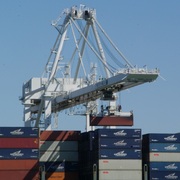
Ford (the company, not the mayor) is upset about the new free trade pact Canadian officials have just concluded with their South Korean counterparts. Among many other things, the deal will eliminate the 6.1% tariff on vehicles imported into Canada from companies like Kia and Hyundai, as well as the 8% tariff on vehicles imported into South Korea from Canada. If that sounds to you like a win for people in both countries, then you're obviously not the president and CEO of Ford of Canada.
"As a global company committed to free trade," wrote Dianne Craig in a press release yesterday, "Ford supports well-negotiated agreements that open new markets for vehicles produced in Canada. For this reason, we cannot support the Canada-South Korea free trade agreement." She went on to express concerns about South Korea's non-tariff trade barriers and currency manipulation, which she said the deal fails to address.
In fact, this country already has a huge trade deficit with South Korea when it comes to vehicles: Roughly 124,000 of them came to Canada from South Korea last year, while only 2,000 went there from here. But is this due to trade barriers, or just to the fact that Hyundai and Kia produce cars Canadians want to buy at a price they can afford? Even if trade barriers are partly to blame, this deal is a step in the right direction, giving carmakers on both sides easier market access. And according to Lawrence Herman, a senior fellow at the C.D. Howe Institute, the deal will "increase the number of Korean vehicles we import by just 1.6 per cent of total Canadian auto sales."
Ford of Canada workers and shareholders might experience some hardship from the elimination of the indirect subsidy they've been receiving from Canadian car buyers (in the form of higher price tags on their competitors' goods). But this will be more than offset by the benefits accruing to everyone as consumers of cars and a whole slew of other goods, and to many workers in other sectors.
Canadians don't need to sell cars to Koreans just because we buy cars from them. We can sell them other things. Or we can sell cars to other people. Or we can sell other things to other people. It's all good. Trade is good, for both buyers and sellers. That's why it happens, voluntarily, if it isn't stopped or hampered by governments and their cronies.
In fact, this country already has a huge trade deficit with South Korea when it comes to vehicles: Roughly 124,000 of them came to Canada from South Korea last year, while only 2,000 went there from here. But is this due to trade barriers, or just to the fact that Hyundai and Kia produce cars Canadians want to buy at a price they can afford? Even if trade barriers are partly to blame, this deal is a step in the right direction, giving carmakers on both sides easier market access. And according to Lawrence Herman, a senior fellow at the C.D. Howe Institute, the deal will "increase the number of Korean vehicles we import by just 1.6 per cent of total Canadian auto sales."
Ford of Canada workers and shareholders might experience some hardship from the elimination of the indirect subsidy they've been receiving from Canadian car buyers (in the form of higher price tags on their competitors' goods). But this will be more than offset by the benefits accruing to everyone as consumers of cars and a whole slew of other goods, and to many workers in other sectors.
Canadians don't need to sell cars to Koreans just because we buy cars from them. We can sell them other things. Or we can sell cars to other people. Or we can sell other things to other people. It's all good. Trade is good, for both buyers and sellers. That's why it happens, voluntarily, if it isn't stopped or hampered by governments and their cronies.